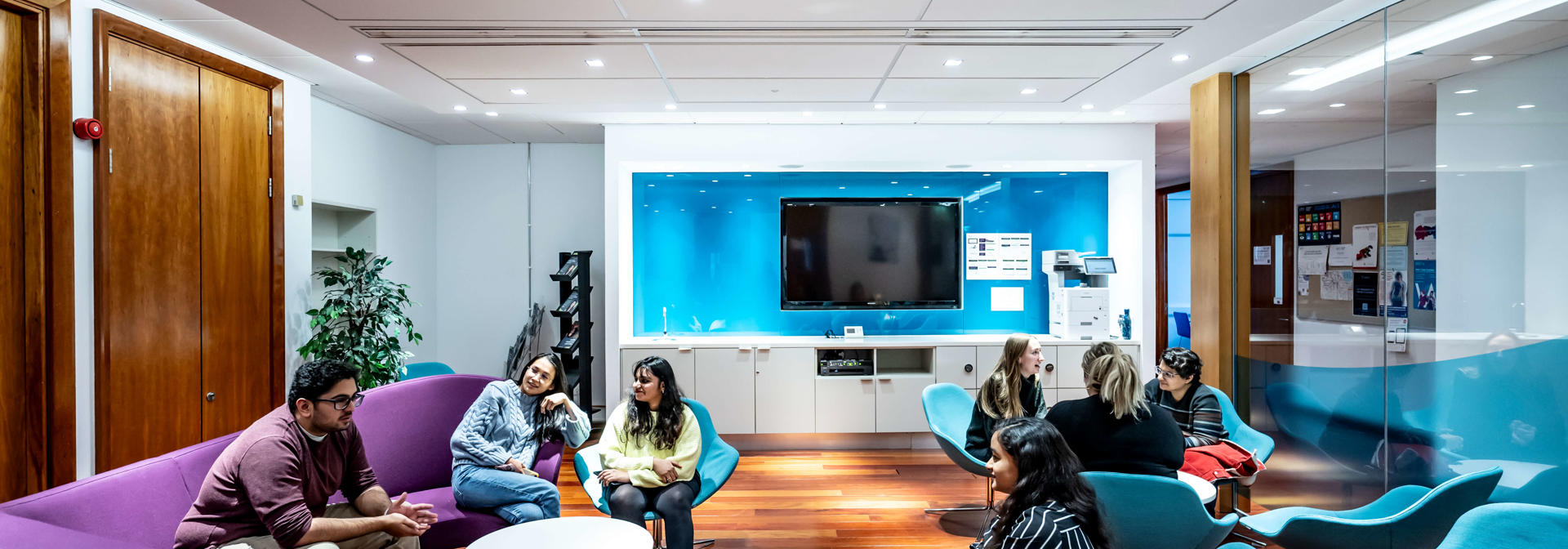Key information
The MA (Hons) Accountancy programme at Edinburgh Business School will prepare you for a career in professional accountancy, business and beyond.
Find out more about our 3 year honours degree option.
- UCAS code
- NN40
- Level
- Undergraduate
- Delivery type
- Full Time
- Degree qualification
- MA
- Mode of delivery
- On-Campus
- Duration
- 3-4 years
- Location
- Edinburgh
- Start date
- September
Our practical-based Accountancy programme has been designed to ensure you’ll have the knowledge and skills most employers value. Whilst studying our accountancy degree, you’ll develop a broad understanding of the context in which modern accounting operates, as well as build accounting expertise in several areas including:
-
Recording and summarising business transactions
-
Preparing and analysing financial statements
-
Analysing and making decisions on business operations
-
Conducting financial analysis
-
Producing and reporting projections
-
Conducting audit
-
Analysing governance issues
-
Gaining awareness of the importance of business ethics
In addition to these key accounting skills, you’ll expand your overall skillset through a combination of individual projects, group work, written reports, presentations, and examinations. Throughout this programme, you’ll also develop skills such as:
-
Analysis
-
Leadership
-
Teamwork
-
Communication
-
Negotiation
-
Conflict resolution
-
Presentation delivery
Each course included in the programme will equip you with highly employable expertise and skills in accountancy, from introduction to accounting and finance, the economy, discovering business, and principles of accounting. You’ll benefit from the industry relevance of the programme, which will set you up for life after graduation. Upon completion, you’ll have the relevant knowledge and skills to start a career in accountancy, business and beyond.
ICAS Foundation Programme
The ICAS Foundation aim to support academically talented young people from family backgrounds with limited resources planning to (or currently) study accounting or finance at university.
Apply nowYour student experience
Our MA Accountancy programme is taught with a clear industry focus by experienced professionals and respected academics. They are accredited by professional bodies and will introduce you to professional-standard software in our state-of-the-art Bloomberg Trading Room.
Go Global
With Go Global, Heriot-Watt's global student programme, you can carry your studies to new places and experience new cultures, expanding your horizons on the way. You'll discover what it means to be a true global citizen and emerge prepared for wherever your career journey will take you.
Inter-Campus Transfer: Dubai
Course content
September Intake - Edinburgh
Year 1
Mandatory September
- Introduction to Accounting
- Management in a Global Context
- Critical Academic Skills
- The Economy
Mandatory January
- Introduction to Economic and Financial Analysis
- Sustainable Business
- Introductory Finance
- Becoming a Professional
Year 2
Mandatory September
- Fundamentals of Finance
- Social and Environmental Accounting
- Principles of Accounting
Mandatory January
- Management Accounting in Organisations
- Financial Markets Theory
- Financial Accounting
- Quantitative Methods 1
Year 3
Mandatory September
- Management Accounting Techniques and Decisions
- Intermediate Financial Accounting
- Introduction to Commercial Law
- Corporate Financial Theory
Mandatory January
- Auditing and Assurance
- Business Law and the Law of Corporate Governance
- Business Research Methods
- Taxation (Tax Law)
Year 4
Mandatory September
- Accounting and Finance Dissertation 1
- Managerial Accounting: Decision Making
- Accounting Information Systems and Technology
Optional September
- International Bond and Currency Markets
- Agency Theory and Corporate Governance
- Risk Management and Derivatives Applications
Mandatory January
- Accounting and Finance Dissertation 2
- Theory and reporting in Accounting
Optional January
- Contemporary Issues in Accounting
- Contemporary Issues in Finance
- Equity Markets and Fund Management
- Advanced Financial Accounting
Disclaimer
The courses mentioned above may change between now and the time that you study. For more information, please view our Terms and Conditions.
Fees and funding
| Status | Fee |
|---|---|
| Scotland | Paid by SAAS |
| England / Wales / N Ireland / Rep of Ireland | £9,790 |
| International | £20,080 |
- Status: Your residency status is usually defined as the country where you have been ordinarily resident for the three years before the start of your course.
- International: 'International' includes applicants from European Union countries who do not hold Pre-Settled or Settled status in UK. (This does not include students from the Republic of Ireland - see above).
Scholarships and bursaries
Bursaries for students from England, Northern Ireland or Wales
In addition to government loans and grants towards the costs of fees and living costs, we are offering generous financial support to attract and support eligible undergraduate students from England, Northern Ireland or Wales:
- Heriot-Watt University Bursary (up to £3,100 per year)
Entry requirements
We have standard entry requirements for all of our courses that you will have to meet.
Year 1
Standard entry requirements
- Highers AABB (over two sittings)
- A-Levels BBC
- International Baccalaureate 29 points
- BTEC Extended Diploma DMM
- HNC B in graded unit
- HNC NextGen Accounting Achieved with Merit
- HND BB in graded units (BBB where HND includes 3 graded units)
- HND NextGen Accounting Achieved with Merit
Please check that you meet our University-wide National 5/GCSE (or equivalent) English and Maths requirements.
Minimum entry requirements *
- Highers BBBC (over two sittings)
- A-Levels BCC
- International Baccalaureate 29 points
- BTEC Extended Diploma MMM
- HNC B in graded unit
- HNC NextGen Accounting Achieved with Merit
- HND BC (C) / CB (B) in graded units (where HND includes 3 graded units)
- HND NextGen Accounting Achieved with Merit
*Minimum: under our Fair Access Policy, we will relax our standard entry requirements for some Scottish and Rest of UK status students depending on their circumstances. Our minimum requirements will apply if you:
- live in an area within the Scottish Index of Multiple Deprivation lowest 20% (SIMD20) or POLAR4 Quintile 1 regions (RUK)
- or are care experienced.
We can also make exceptions for some Scottish students with grades above minimum but below standard. Read more about our Minimum and standard entry requirements.
Year 2
- Advanced Highers BB. Must include one of Accounting, Business, Economics or Maths, plus AABB at Higher.
- A-Levels BBB to include one of Accounting / Business / Economics / Maths.
- International Baccalaureate 34 points. Must include Higher Level 5 in Business Management, Maths or Economics.
- BTEC Extended Diploma DDM in Business or Accountancy relevant subject.
- HNC Business or Accounting A (standard entry) or B (minimum offer eligible only) in graded unit.
- HNC NextGen Accounting with Distinction.
- HND Business BB or HND Accounting with BBB in graded units.
- HND NextGen Accounting with Merit & Distinction (HNC and HND must have been completed)
- Global College Successful completion of our Accounting and Finance with Foundation programme.
Year 3
- HND Accounting with AAA (standard entry) or BBB (minimum offer eligible only)
- HND NextGen Accounting with Distinction (HNC and HND must have been completed in Accounting)
Additional information
- To gain maximum exemptions from accountancy bodies such as ACCA and ICAS, students should enter into Year 1.
- For all years, applications are welcomed from holders of non-school qualifications, mature candidates and overseas students.
- If you do not see your qualifications here please contact us at studywithus@hw.ac.uk
- When applying with an HND NextGen for advanced entry, applicants must also have successfully completed either an HNC or an HNC NextGen.
- HNC, HND or BTECs in other finance relevant subjects may be considered for advanced entry to Year 2 on a case-by-case basis and may require specific units to have been studied.
- For applicants studying HNC, HND or BTEC qualifications, when submitting your application please ensure you list in full all the units you are currently studying, as specific units (e.g. in Maths) may be required.
English language requirements
If your first language is not English, we'll need to see evidence of your English language ability.
The minimum English language requirement for entry to this programme is IELTS 6.0 (or equivalent) with no score lower than 5.5.
If you do not have IELTS 6.0, we offer a range of English language courses to help you meet the English language requirement for this programme prior to commencing your studies.
Please see our detailed English language requirements.
Why Heriot-Watt
We're the top university in Scotland for graduate outcomes which means that more of our graduates are employed or in postgraduate education than any other institution in the country and we ranked 5th in the UK.
We're also rated number one in the UK for CEO or MD roles, meaning more of our graduates go on to become CEOs or MDs than any other university in the whole of the UK. On top of that, we have beautiful campuses, across the globe, so you'll get a truly international education. Our Edinburgh Campus is home to Oriam, Scotland's National Sports Performance Centre combined with plenty of wellbeing resources, prioritising fitness and mental health for all students. Our Global Research Institutes look at solving real world issues such as climate change and saving our oceans as well as working on the next medical technological breakthrough and the future of AI and robots.
Employability
We’re delighted that Edinburgh Business School has the highest percentage of graduates in Scotland who are appointed to a CEO or MD role (Novuna Business Cash Flow, 2025). We’re also 1st in Scotland and joint 2nd in the UK for graduate prospects (HESA Graduate Outcomes Survey 2025). Typical careers for Accountancy graduates include chartered accountants, finance professionals, and business, research and administrative professionals.
Work and study
Salary
Potential career paths
- Finance Professionals
- Business and public service associate professionals
Student life
Explore facilities, and chat to staff and students
Discover Uni course data
Discover Uni provides data on each university's degree courses across a range of measures including student satisfaction, graduate jobs and salaries.





